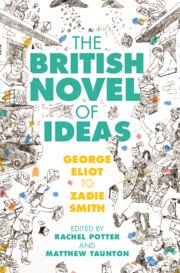Book contents
- The British Novel of Ideas
- The British Novel of Ideas
- Copyright page
- Contents
- Contributors
- Dedication
- Introduction The British Novel of Ideas
- Part I 1850–1900
- Part II 1900–1945
- Chapter 5 The British Novel of Ideas in an International Context
- Chapter 6 H. G. Wells
- Chapter 7 G. K. Chesterton
- Chapter 8 E. M. Forster
- Chapter 9 Aldous Huxley
- Chapter 10 Katharine Burdekin
- Chapter 11 Mulk Raj Anand
- Chapter 12 Storm Jameson
- Part III 1945–1975
- Part IV 1975–Present
- Bibliography
- Index
Chapter 11 - Mulk Raj Anand
Anti-colonialism and Abjection
from Part II - 1900–1945
Published online by Cambridge University Press: 05 December 2024
- The British Novel of Ideas
- The British Novel of Ideas
- Copyright page
- Contents
- Contributors
- Dedication
- Introduction The British Novel of Ideas
- Part I 1850–1900
- Part II 1900–1945
- Chapter 5 The British Novel of Ideas in an International Context
- Chapter 6 H. G. Wells
- Chapter 7 G. K. Chesterton
- Chapter 8 E. M. Forster
- Chapter 9 Aldous Huxley
- Chapter 10 Katharine Burdekin
- Chapter 11 Mulk Raj Anand
- Chapter 12 Storm Jameson
- Part III 1945–1975
- Part IV 1975–Present
- Bibliography
- Index
Summary
This chapter takes as its starting point Mulk Raj Anand’s literary interest in what he describes as “earthiness”, and argues that it is neither a simplistic yardstick of social realism, nor simply a derivation of Anglo-American modernism, but something in between, something different, and perhaps something more. In common with many of the other chapters in this volume, I make the case that Mulk Raj Anand was neither a modernist nor a realist, and that for a more satisfactory evaluation of Anand-the-novelist, we need to follow an entirely different literary tradition. Focusing on the dirtiness and squalor that is present in much of Anand’s writing, I argue that Anand deploys this trope to make the novel into neither a realist depiction of the world, nor a disaffected, alienated exercise in aestheticism, but as a vehicle to explore what it might mean to be modern, what it might mean to be anti-colonialist and what it might mean to be nationalist.
- Type
- Chapter
- Information
- The British Novel of IdeasGeorge Eliot to Zadie Smith, pp. 192 - 206Publisher: Cambridge University PressPrint publication year: 2024

